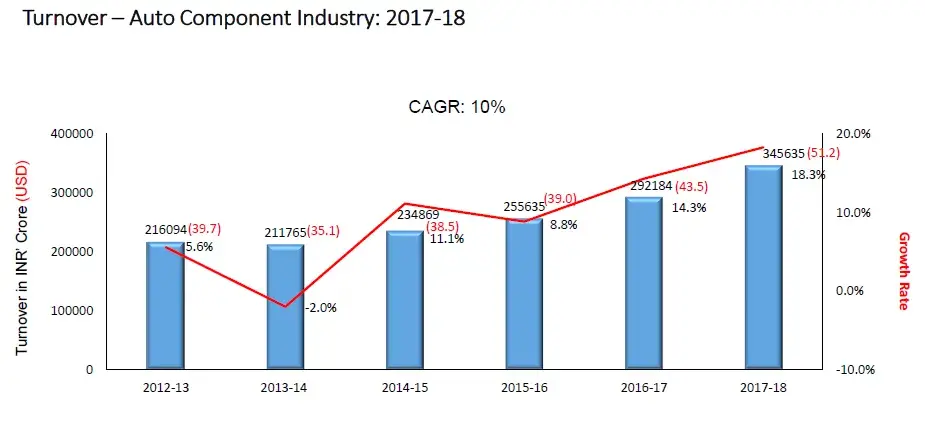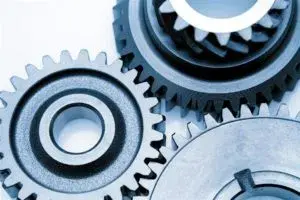By Sanjana Kala and Pranit Biswas
In 2017, the automobile industry in India became the 4th largest in the world and by 2018, it became the 7th largest manufacturer of commercial vehicles worldwide.[1] Consequently, its related industry, namely, the automotive components and spare parts industry, also acquired market prominence not only in India but around the world. Since consumption for automotive parts is directly linked to the demand for new vehicles, the automotive components and spare parts industry is quite reliant on the growth of the automobile industry. The annual turnover and growth of the automotive components and spare parts industry (as shown below)[2] demonstrates its upwards trend over the years.

The automotive components and spare parts industry can be classified into two groups:
- Parts that originate from the Original Equipment Manufacturer (OEM) and are considered the organized sector of the auto component and spare parts industry consisting of high-value precision parts[1];
- The “automotive aftermarket” (as it is known in industry parlance) forms part of the unorganized auto components and spare parts sector and deals with the manufacture, distribution, retail and installation of low-quality vehicle parts/equipment/accessories, after the sale of the automobile.[2] An “aftermarket part” is any part for a vehicle that is not sourced from the car’s original maker.[3] These aftermarket parts are further divided into the following two categories:
- Replacement parts which are automotive parts built to replace worn out or damaged OEM parts;
- Accessories are ‘add-on’ automotive parts built for the purposes of customization, enhancing a vehicle’s appearance, performance and/or safety.[4]
As with most other industries like food and fashion[5], the auto components and spare parts industry is also facing major challenges in tackling the menace of counterfeit goods in circulation in the market. In terms of trademark law, counterfeiting occurs when a third party in an unauthorized and unlawful manner sells/offers for sale replicated goods bearing someone else’s trademark with a view to gain illegal profits. This not only affects the business of trademark owners, but also poses a significant risk to consumer health and safety, particularly in an industry like the automotive components and spare parts industry, where fraudulent or fake parts can cause significant damage to an unwary consumer in life threatening situations.
Notably, counterfeiting in the automotive components and spare parts industry is more rampant in the aftermarket sector owing to the absence of any mandated safety standards for after-market products because of which import of counterfeit products cannot be checked and/or regulated.[6] Moreover, the threshold of consumer sophistication is higher in the OEM sector as compared to the aftermarket sector. Some other factors contributing to the automotive component and spare parts counterfeit market in India are:
- ease of manufacturing, packaging and importing these products;
- higher margins on the sales of counterfeits;
- short replacement cycles of some parts and,
- supply constraints faced by original component manufacturers.
In this regard, it is pertinent to note a July 2015 order[8] of the Competition Commission of India (CCI) against Hyundai Motor India Ltd and various other auto companies wherein a penalty of INR 4,200,000,000 (USD 58720200) was imposed on Hyundai for not making their original spare parts available in the open market, thereby preventing independent repairers to procure genuine spare parts in the aftermarket. The CCI further rejected Hyundai’s claim that the drawings/designs of their spare parts are protected by unregistered copyright and trade secret, and refused to grant Hyundai an exemption under Section 3(5) of the Competition Act, 2002, which protects exclusive rights granted under intellectual property rights.
Even though the Supreme Court granted a stay on CCI’s order, the above decision implies that if OEM’s want to ensure protection of their spare parts in the aftermarket, it is advisable for them to obtain some form of IP protection, such as, design registration in respect of their original spare parts.
Further legal recourse available to trademark holders against instances of counterfeiting is enshrined in the Trade Marks Act, 1999 under Sections 102, 103 and 135 which penalize falsification of trademarks. Other prevention measures that brand owners can adopt include consumer awareness and proactive enforcement of their trademark rights via criminal raids and recording their trademarks with the Customs Authority of India for monitoring. The government can also employ industry specific remedies, such as introduction of certifications for automotive components and spare parts, introduce legislations to increase consumer protection on e-commerce websites and provide strict penalties that can act as a deterrent to counterfeiters. However, to bring about a wholesome change, all three points of contact in the industry, namely, the governing authority, the supplier/provider and the end consumer need to join hands to bring about an end to the counterfeiting problem in the auto components and spare parts industry.
[1] https://www.ibef.org/industry/india-automobiles.aspx
[2] https://www.acma.in/auto-component.php
[3] https://www.ibef.org/industry/autocomponents-india.aspx
[5] https://www.edmunds.com/car-maintenance/aftermarket-versus-manufacturer-car-parts.html
[6] See supra note 3
[9] https://www.cci.gov.in/sites/default/files/03201127.pdf
Related Posts
Automobile industry expects a reduction in GST rates
Automobile companies required to pay 28% GST on imported plastic products


